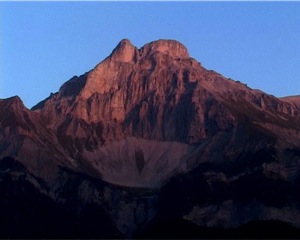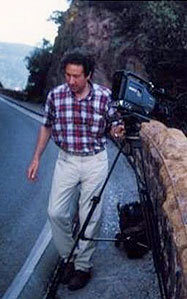
LUCY'S GARDEN
Year: 2005
Lenght: 90 min
Copyright: Alberto Cima
Direction, screenplay, cinematography and editing: Alberto Cima.
Assistant director: Paola Ratti.
Live sounds
English French Italian Subtitles
Cast:
Lucia Dolci, Battista Locatelli, Carla Poncet, Benoît Locatelli, René Locatelli, Marise Dusé, Corinne Poncet, Pierre Poncet, Sylviane Vincent, Delphine Poncet, Stephan Locatelli, Sylvain Locatelli, Gaëlle Faure, Mélanie Dusé, Titouan, Mathieu, Emma, Nino, Elena
Financed:
by Region Lombardy and Algra Spa, this film is inside the collection of film-documents of the Centro Studi Valle Imagna.
Watch it on YouTube
Subject:
Tréminis, Grenoble, France. Lucy emigrated with her husband Battista in 1952. Children of poverty in the post-war years. A small world, only 2 years of school, family and church. Their four children are free and independent, but in the end they're more lonely and fragile. Their eight grandchildren who are French in every sense of the word, have more money, free time, culture and interests. All of them find solice in Lucy, always. Lucy's garden is what Lucy has sown: her loves, fears and regrets.
Review:
Andrea Frambrosi
Cima the poet of the camera.Cima, il poeta della cinepresa.
Entitiled Lucy’s Garden, it is the latest magnificent film-document by Alberto Cima. The film is the story of Lucy’s life. But it’s also a lot more besides: the subtle representation, intelligent – loaded with a pietas which one is rarely able to see in cinema with such intensity – of five generations, linked by the thin thread of Alberto Cima’s camera which is almost able to disappear letting the characters emerge onto the screen.
“What I want” Cima explains – is to cross a threshold, enter into a new world in which everyone reveals themselves as they are, with their solitude and their wealth. It is a slow process of subtraction, unveiling, which raises the surface and lets each one shine in their own light, their own intimate truth”. The striking thing about Alberto Cima’s cinema is his capacity to enter into an intimate syntony with the people he is filming, a technique which hides a secret. “filming others I am actually talking about myself”. It is this which is probably the most profound sense of being an author.
Lucy’s garden will be presented on Il giardino di Lucia sarà presentato il 27 November 2005 at the Grenoble film library.
Alberto Pesce Cima follows the daily work in Lucy’s house, in the vegetable patch, the chicken coop, she listens to soliloquies and interviews, and tightly winds a net of love around her with the words of her loved ones, children and grandchildren, who talk of themselves, of their dreams and needs, thus also revealing Lucy’s genuine humanity.
Once again Cima’s scenic virtue rests not only that of giving spontaneity to characters recuperating a world of values with their presence. He does so with such wisdom of filming that he also puts the viewer inside the scene, a participating witness yet also an involved party to a suit, with a silent dialogue of looks, gestures, consents, smiles.
Andrea Frambrosi The Bergamascan director Alberto Cima will be the protagonist today of the XXIV National Eucharistic Congress which is taking place in Bari, in the course of which his new film-documentary “Lucy’s Garden” will be presented.
It is a garden of memories: 50 years of emigration unrolled infront of Alberto Cima’s camera which will the usual discretion and intelligence is able to knot back together the threads of Lucy and her family’s story, emigrants to France. Alberto Cima’s cinema is with every new work more and more lucid and honed without however abandoning the curiosity of a shared yet analytical view which has always characterised his work. This has led to an insight into man and reality: with his camera Alberto Cima digs into the souls of men.
Angelo Signorelli The last work of Alberto Cima is unmissable, a Bergamascan author who with Lucy’s Garden signs a work of rare suggestiveness, telling the present of a family of emigrants with shared respect and sensitivity in catching emotions and affections.
Tréminis, Grenoble, France. Lucy emigrated with her husband Battista in 1952. Children of poverty in the post-war years. A small world, only 2 years of school, family and church. Their four children are free and independent, but in the end they're more lonely and fragile. Their eight grandchildren who are French in every sense of the word, have more money, free time, culture and interests. All of them find solice in Lucy, always. Lucy's garden is what Lucy has sown: her loves, fears and regrets.
Review:
Andrea Frambrosi
Cima the poet of the camera.Cima, il poeta della cinepresa.
Entitiled Lucy’s Garden, it is the latest magnificent film-document by Alberto Cima. The film is the story of Lucy’s life. But it’s also a lot more besides: the subtle representation, intelligent – loaded with a pietas which one is rarely able to see in cinema with such intensity – of five generations, linked by the thin thread of Alberto Cima’s camera which is almost able to disappear letting the characters emerge onto the screen.
“What I want” Cima explains – is to cross a threshold, enter into a new world in which everyone reveals themselves as they are, with their solitude and their wealth. It is a slow process of subtraction, unveiling, which raises the surface and lets each one shine in their own light, their own intimate truth”. The striking thing about Alberto Cima’s cinema is his capacity to enter into an intimate syntony with the people he is filming, a technique which hides a secret. “filming others I am actually talking about myself”. It is this which is probably the most profound sense of being an author.
Lucy’s garden will be presented on Il giardino di Lucia sarà presentato il 27 November 2005 at the Grenoble film library.
Alberto Pesce Cima follows the daily work in Lucy’s house, in the vegetable patch, the chicken coop, she listens to soliloquies and interviews, and tightly winds a net of love around her with the words of her loved ones, children and grandchildren, who talk of themselves, of their dreams and needs, thus also revealing Lucy’s genuine humanity.
Once again Cima’s scenic virtue rests not only that of giving spontaneity to characters recuperating a world of values with their presence. He does so with such wisdom of filming that he also puts the viewer inside the scene, a participating witness yet also an involved party to a suit, with a silent dialogue of looks, gestures, consents, smiles.
Andrea Frambrosi The Bergamascan director Alberto Cima will be the protagonist today of the XXIV National Eucharistic Congress which is taking place in Bari, in the course of which his new film-documentary “Lucy’s Garden” will be presented.
It is a garden of memories: 50 years of emigration unrolled infront of Alberto Cima’s camera which will the usual discretion and intelligence is able to knot back together the threads of Lucy and her family’s story, emigrants to France. Alberto Cima’s cinema is with every new work more and more lucid and honed without however abandoning the curiosity of a shared yet analytical view which has always characterised his work. This has led to an insight into man and reality: with his camera Alberto Cima digs into the souls of men.
Angelo Signorelli The last work of Alberto Cima is unmissable, a Bergamascan author who with Lucy’s Garden signs a work of rare suggestiveness, telling the present of a family of emigrants with shared respect and sensitivity in catching emotions and affections.

